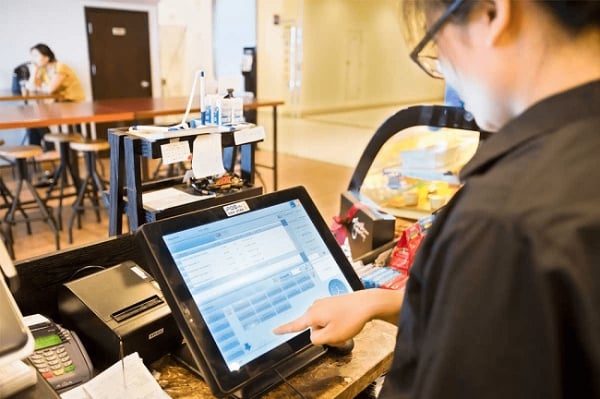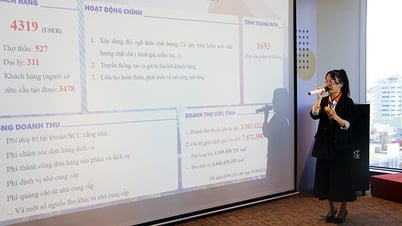Recently, the fact that a series of small traders at traditional markets across the country have temporarily suspended business or closed their stalls has attracted public attention. This is an "unprecedented" situation that has been and is taking place in many localities across the country.
The main reason comes from the fact that state management agencies have increased inspection of the origin and source of goods and electronic invoices.
Decree No. 70/2025/ND-CP issued by the Government on March 20, 2025 has expanded the subjects required to apply electronic invoices from cash registers. Accordingly, from June 2025, all business households and individuals paying taxes under the lump-sum method with revenue of VND 1 billion/year or more and operating in the retail sector, providing goods and services directly to consumers will be required to issue electronic invoices from cash registers.
From June 2025, all business households and individuals paying taxes under the lump-sum method with revenue of 1 billion VND/year or more and operating in the retail sector, providing goods and services directly to consumers will have to issue electronic invoices from cash registers.
According to the Ministry of Finance , this is a preparation step for business households to gradually grow, get used to new management methods, and have transparent revenue like enterprises. At the same time, it helps tax authorities collect more realistic revenue data for the business household sector.
However, many small traders reported difficulties and confusion in proving the origin of goods as well as declaring taxes and declaring taxes via electronic invoices...
Talking to Vietnam Business Magazine about this issue, Ms. Pham Thi Quyen - a training expert in the field of accounting - finance and tax said that using electronic invoices is inevitable in the context of the digital economy penetrating all activities of life, production and business.
However, the reason why many small businesses have closed is mainly due to the fear of being punished due to not understanding the regulations related to the origin of goods and electronic invoices. The change in the way of operation, along with the fear of violations, has made it difficult for many small businesses to adapt, leading to temporary closure.
In fact, most small traders are not fully prepared to adapt to the changes. Small traders are used to manual business practices and have little exposure to legal regulations and technology. In addition, small traders are concerned about compliance costs. The speed at which small traders access, understand and implement the law has not kept up with the speed at which the State completes and implements policies.
According to experts, the mandatory implementation of electronic invoices generated from cash registers is a correct policy and in line with the trend of modernizing tax management. However, with the characteristics of small and retail businesses in traditional markets that are accustomed to manual recording, there needs to be a reasonable transition period for small traders to get used to and adapt.
Ms. Pham Thi Quyen - training expert in the field of accounting - finance and tax.
If they are thoroughly instructed and practiced from the beginning, small traders will find that using electronic invoices is not complicated. They will gradually realize the benefits of information transparency, understanding daily income and expenses, thereby managing their business more effectively. After a short time, this will become a habit and help them feel more secure when doing business, avoiding tax risks, and having more time to focus on developing their business activities in a more sustainable and effective direction.
According to Ms. Quyen, in order for the implementation of tax regulations and electronic invoices to be smoothly received by small businesses and to avoid disruptions to business operations, there needs to be a specific roadmap, accompanied by effective support solutions.
First of all, the propaganda and dissemination of the law must be done systematically, closely related to reality and easy to understand. It is necessary to explain to traders the humane meaning of paying taxes - not only as a civic duty but also as a condition for them to do business transparently, access support policies, expand their scale and build a long-term brand.
Many small traders have long followed the habit of small-scale trading to make a living, paying little attention to the law. Therefore, it is necessary to persistently organize training sessions, seminars, and dialogues, especially at traditional markets, to both instruct practical skills and listen and promptly answer questions.
At the same time, the management agency needs to review and simplify processes and procedures - from registration, invoice creation to tax declaration - to make them easy to access, easy to understand, and easy to implement. Support tools such as software and cash registers need to be user-friendly, cost-effective, and have a team of technical support directly for small traders.
Finally, after the guidance and transformation phase, there needs to be a gentle, supportive inspection and supervision step to promptly detect and correct shortcomings - avoiding pressure, thereby creating consensus and gradually changing the business habits of small traders in a more modern and sustainable direction.
Minh Thu
Source: https://doanhnghiepvn.vn/chuyen-doi-so/kinh-te-so/dua-tieu-thuong-vao-he-thong-thue-so-can-lo-trinh-va-ho-tro-cu-the/20250609050435921




































































































Comment (0)